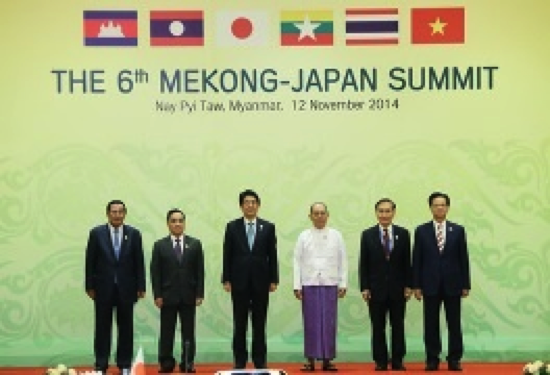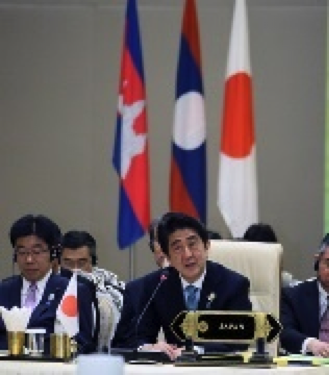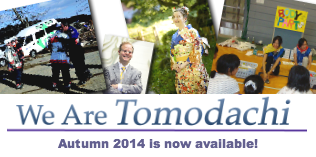[Ministry of Foreign Affairs] [Wednesday, Nov 12, 2014]
17th Japan-ASEAN Summit Meeting
The 17th Japan-ASEAN Summit Meeting was held for 1 hour on November 12 in Naypyidaw, Myanmar. Prime Minister Shinzo Abe attended the meeting. The overview of the meeting is as follows. The Japan-ASEAN joint declaration for cooperation to combat terrorism and transnational crime was adopted at the Summit Meeting.
1. Review of Japan-ASEAN relationship and the way forward
At the beginning, Prime Minister Abe said he wants to steadily implement the Vision Statement on ASEAN-Japan Friendship and Cooperation and the Joint Statement that were adopted at the ASEAN-Japan Commemorative Summit Meeting in December last year, and deepen cooperation further. Discussions took place in line with the four pillars of the Vision Statement.
(1) Partners for Peace and Stability
i) Prime Minister Abe explained initiatives of the "Proactive Contribution to Peace" policy based on the principle of international cooperation, including the Cabinet Decision on the Development of Security Legislation and the review of the Guidelines for U.S.-Japan Defense Cooperation.
ii) Regarding cooperation in the area of maritime security and safety, Prime Minister Abe explained that Japan will continue to cooperate on Japan-ASEAN joint exercises, human resources development and safety of navigation, and announced that Japan will support human resources development for capacity building of maritime security and safety for approximately 700 personnel over the next three years.
iii) Prime Minister Abe welcomed the holding of the Japan-ASEAN Defense Ministers' Round Table Meeting scheduled to take place on November 19, and said he also wants to further deepen cooperation between defense authorities.
(2) Partners for Prosperity
i) Prime Minister Abe said the commitment of 2 trillion yen of official development assistance (ODA) over five years that he announced at the Commemorative Summit Meeting last year has already reached approximately 600 billion yen. He said Japan will support the building of the ASEAN Community, through the Japan-ASEAN Integration Fund (JAIF) 2.0 and cooperation projects for enhancing ASEAN Connectivity.
ii) Prime Minister Abe said that in order to respond appropriately to enormous infrastructure demand and achieve "quality growth," it will be essential to promote "people-centered investment." He said Japan is enhancing its support for the development of "quality infrastructure" in ASEAN through such approaches as: 1) preparing support options for effective resource mobilization; 2) long-term cooperation with developing countries through consultation and planning, and strengthening partnerships with multiple development partners; 3) social and environmental considerations as well as life cycle cost; and 4) comprehensive and tailor-made approach.
iii) Prime Minister Abe welcomed that Japan and ASEAN has started the consultation toward the conclusion of a regional air services agreement between Japan and ASEAN. In regard to the ASEAN Japan Comprehensive Economic Partnership (AJCEP) he said that in order to achieve a higher level agreement it will be important for both sides to respond promptly and proactively.
(3) Partners for Quality of Life
i) Prime Minister Abe said Japan is attaching importance to achieving Universal Health Coverage (UHC) in ASEAN, and as part of the "ASEAN-Japan Health Initiative" it intends to support human resource development targeted at 8,000 individuals for the next five-years in order to promote health, prevent illness and enhance the level of medical care.
ii) Prime Minister Abe said that of the "ASEAN-Japan Disaster Management Cooperation" that he announced at the Commemorative Summit Meeting last year, already approximately 60 billion yen of support has been implemented and approximately 250 individuals have been trained, and Japan will continue to provide support through the AHA Center (ASEAN Coordinating Centre for Humanitarian Assistance on Disaster Management) and other entities. He also invited participation in the Third UN World Conference on Disaster Risk Reduction in Sendai in March next year.
iii) Prime Minister Abe mentioned the importance of higher efficiency coal-fired power generation, and said he wants to cooperate on realizing "a society in which women shine."
(4) Heart-to-Heart Partners
Prime Minister Abe said that under projects such as the JENESYS 2.0 program, the "WA Project: Toward Interactive Asia through Fusion and Harmony" and "Sport for Tomorrow," heart-to-heart partnerships are steadily growing. Thus far, around 6,200 ASEAN youths have been invited to Japan, approximately 350 Japanese students have been dispatched to ASEAN, and football youth teams were invited and lively exchanges took place in April this year under the JENESYS 2.0 program. Where the "WA Project" is concerned, bidirectional exchanges are steadily developing, including the commencement of dispatches of "NIHON-GO (Japanese language) Partners", and exchanges of ASEAN region films in cooperation with the Tokyo International Film Festival.
2. Regional and international affairs
(1) Commenting on the South China Sea, Prime Minister Abe said he hopes that the parties concerned will act in accordance with “the Three Principles of the Rule of Law at Sea” that he advocated at the Shangri-La Dialogue, and it is important to reaffirm that it is a regional issue of common concern.
(2) Regarding North Korea, Prime Minister Abe said North Korea’s continued nuclear and missile development poses a serious threat to the peace and stability of the Asia region. He said the abductions issue is a serious problem that concerns sovereignty and the lives and safety of citizens, and as a violation of fundamental human rights it is a problem of the international community overall.
(3) Prime Minister Abe said he wants Japan and ASEAN to cooperate closely on urgent international challenges such as the Ebola virus disease outbreak and ISIL.
[Ministry of Foreign Affairs] [Wednesday, Nov 12, 2014]
The Sixth Mekong-Japan Summit Meeting
On November 12, commencing at 7:45 p.m. (local time) for approximately 30 minutes, the Sixth Mekong-Japan Summit Meeting (hereafter referred to as "the Mekong-Japan Summit") was held in Nay Pyi Taw, Republic of the Union of Myanmar. Mr. Shinzo Abe, Prime Minister of Japan co-chaired the Summit with H.E.Mr. U Thein Sein, President of the Republic of the Union of Myanmar. The outline of the meeting is as follows. (The Summit was also attended by Prime Minister Samdech Akka Moha Sena Padei Hun Sen, the Kingdom of Cambodia (H.E. Mr. Hor Namhong, Deputy Prime Minister and Minister of Foreign Affairs and International Cooperation attended the Summit as Prime Minister Hun Sen's representative from midway), H.E. Mr. Thongsing Thammavong, Prime Minister of the Lao People's Democratic Republic, H.E. Mr. Prayuth Chan-o-cha, Prime Minister of the Kingdom of Thailand, and H.E. Mr. Nguyen Tan Dung, Prime Minister of the Socialist Republic of Viet Nam). The result of the Summit was released as a joint statement (attached).
Joint Statement
1. At the beginning, President Thein Sein expressed gratitude for the support and cooperation Japan has extended to the Mekong region thus far. In response, Prime Minister Abe stated that under "diplomacy that takes a panoramic perspective of the world map," active high-level mutual visits are continuing this year and the Mekong-Japan relationship is steadily deepening. Prime Minister Abe said he would like to reconfirm the direction of the Mekong-Japan cooperation towards the building of the ASEAN Community and the last year of the "Tokyo Strategy 2012" in 2015.
2. Regarding the development and the future direction of the Mekong-Japan cooperation, Prime Minister Abe explained that Japan is working diligently on the three pillars of the Mekong-Japan cooperation, which are "Enhancing Mekong Connectivity," "Developing Together," and "Ensuring Human Security and Environmental Sustainability," and of the 600 billion yen of support pledged in the "Tokyo Strategy 2012," more than 500 billion yen is already being steadily implemented. In addition, Prime Minister Abe said:
(1) Where "Enhancing Mekong Connectivity" is concerned, in order to respond appropriately to the massive infrastructure demand in the Mekong region, Japan is proactively promoting packaged infrastructure exports as well as steadily developing the Southern Economic Corridor (SEC) and East-West Economic Corridor (EWEC). Prime Minister Abe explained that quality infrastructure is Japan's strong point.
(2) With regard to "Developing Together," Prime Minister Abe stated that, in order to pursue win-win economic development with the Mekong region countries under "Abenomics", Japan will work diligently on the new drafting of the "Mekong Industrial Development Vision," as well as deepening the public-private dialogue and cooperation, improving the investment environment and strengthening people-to-people exchanges including tourism.
(3) Commenting on "Ensuring Human Security and Environmental Sustainability," Prime Minister Abe stated that Japan will continue to contribute to water resources management in the Mekong region via the contribution of approximately 500 million yen to the Mekong River Commission and the dispatch of Japanese expert, and explained that Japan and Thailand will co-host the 3rd Green Mekong Forum in Bangkok in December this year.
(4) Furthermore, Prime Minister Abe stated that coordinating with other countries and international organizations is also important for further developing the Mekong region, and in particular, he will work to strengthen cooperation with the United States in the fields of the environment and supporting women entrepreneurs, and strengthen cooperation with the OECD in improving the investment environment via the OECD South East Asia Regional Programme, and supporting small- and medium-sized enterprises.
3. The remarks made by the leaders of the Mekong region countries in response to this are outlined as follows:
(1) The Mekong-Japan cooperation based on the three pillars of the "Tokyo Strategy 2012" is essential to the prosperity and development of the Mekong region, and the leaders appreciate the remarkable progress in that. They are grateful for Japan's long time contribution to the Mekong region, and requested Japan's continuous support.
(2) In particular, the leaders of the Mekong region countries highly appreciated that, Japan is playing a constructive role by utilizing the expertise and experience of both the public and private sectors, in fields such as infrastructure development, including support for economic corridors, the Dawei Special Economic Zone Project, disaster reduction and water resources management. In connection with this, they welcomed the Green Mekong Forum co-hosted by Japan and Thailand in December this year and the Third World Conference on Disaster Risk Reduction to be held in Japan in March next year.
(3) The leaders stated that they would like to continue to hold discussions between Japan and Mekong countries on the direction of the Mekong-Japan cooperation beyond 2015, in the lead up to the next Mekong-Japan Summit.
4. Lastly, Prime Minister Abe reiterated that under the "Proactive Contribution to Peace" policy, Japan is determined to continue her contribution to peace and stability of the region in partnership with the Mekong region countries, and the leaders affirmed that the Seventh Mekong-Japan Summit will be held in Japan in July 2015.
 Photo: Cabinet Public Relations Office
Photo: Cabinet Public Relations Office  Photo: Cabinet Public Relations Office
Photo: Cabinet Public Relations Office
[The Government of Japan] [Monday, Nov 17, 2014]
"We Are Tomodachi Autumn 2014" is now available! [UPDATED!]
The latest issue of "We Are Tomodachi", Japanese Gov’t official magazine, is now available. Learn about Japanese high technology such as the Shinkansen, enjoy beautiful autumn photos in Japan, and more!
